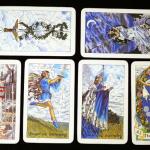Once upon a time people lived in a world of magic and wonder, a world where anything could happen and often did. But then something went wrong – something was lost. And now we live in a bland world filled with drudgery, a world where “magical thinking” is an insult of the highest order. Our world has become disenchanted and we need to re-enchant it.
But when, exactly, was this once upon a time? Because the feeling of disenchantment is not new. Writing in the 14th century, Geoffrey Chaucer complained that once “all was this land fulfild of fayerye” but “now kan no man se none elves mo.” Jason Josephson-Storm’s 2017 book The Myth of Disenchantment: Magic, Modernity and the Birth of the Human Sciences showed that while each generation complains of disenchantment, they still have magical and Otherworldly experiences that the next generation will look back on with envy.
This week I came across a piece from 2020 in the Los Angeles Review of Books titled The Trouble with Re-Enchantment. It’s quite long (over 6800 words) and rather dense, but it’s useful for how it calls out many of the prophets of re-enchantment for wanting “something like re-enchantment without the enchantment” – they want the feeling of enchantment while still maintaining a thoroughly materialistic worldview. Writer Jason Crawford also points out that much of the disenchantment of modernity comes from Protestant and especially Puritan attacks on Catholicism. Anyone who points out the problems caused by Calvinism is a friend of mine… or at least, an occasionally-useful ally.
The weakness of Crawford’s dissertation – and the reason I wrote this post – is its lack of actionable recommendations. Re-enchantment isn’t a technology that needs to be adopted or a social policy that needs to be enacted into law. It’s a way of seeing the world and relating to the world that happens on an individual level.
We live in a world that’s already enchanted, a world that in the words of biologist J.B.S. Haldane, “is not only queerer than we suppose, but queerer than we can suppose.”
We just have to learn how to see that enchantment and relate to it.

1. Embrace animism
For most people this is the hardest of the five steps, so I thought about putting it last. But there is simply no way to experience re-enchantment at its deepest levels while you’re clinging to the materialistic idea that the universe consists of nothing more than dead matter.
Animism is the idea that whatever animates you and me also animates the birds and squirrels, the grass and trees, the wind and rain, and the rivers and mountains. It’s the idea that every being in the world is not a thing but a person, with the inherent dignity and worth possessed by all persons.
When we understand that the world is alive, and that it’s filled not with mindless matter but with mindful persons – persons with whom we can form relationships – we prepare ourselves to find enchantment, and to recognize it when we do.
If you want to learn more about animism, start with Animism: Respecting the Living World by Graham Harvey (2005). Then read The Wakeful World: Animism, Mind and the Self in Nature by Emma Restall Orr (2012).
Or just think about what it means when you talk to your cat or dog. And then go talk to a tree.
2. Celebrate the seasons
This one is much easier. If you’re Pagan you probably do it already, either on the Wheel of the Year, on another liturgical calendar, or just by being outside and paying attention. The Wheel of the Year has the additional advantage of reminding us to celebrate our traditions, our Gods, and our world every 6½ weeks, on average.
We just passed Imbolc, which celebrates the promise of Spring in the middle of Winter. The Spring Equinox is next on the Wheel, celebrating equal day and night. Beltane on May 1 celebrates the return of life and fertility to the land.
When we celebrate the seasons we stay in sync with the rhythms and cycles of Nature. We notice the small miracles of the lengthening days, the budding trees, the returning birds, and the warming temperatures. In the Fall we notice their opposites. By aligning ourselves with Nature, we’re better able to experience the wonder and awe – the enchantment – that Nature brings… and to remember that we’re a part of it all.
3. Pray
Prayer has a bad reputation in some circles. That’s unfortunate. The fact that some people try to substitute prayer for action doesn’t change the fact that prayer is one of the most basic and most helpful spiritual practices.
Prayer is simply talking to the Gods. Or to our ancestors, to the spirits of Nature, or to our better selves. Prayer gives voice to the deepest yearnings of our hearts.
When we pray, we bring ourselves into the presence of our Gods and in communion with Their values and virtues. In doing so, we become a little more God-like ourselves, and that’s a very good thing.
Regular prayer reminds us that life is more than just the ordinary world, as wonderous as the ordinary world is. And that is truly enchanting.
4. Do witchcraft
I was going to be more generic and title this section “work magic.” There is little that will re-enchant your world faster than working magic and seeing the results. Magic doesn’t work on belief. Magic works on energy and correspondences and relationships – do the spell right and you’ll get results. Not every time, but often enough that you’ll eventually get to the place where it’s easier to accept the reality of magic than to continue to rationalize it away.
But my definition of witchcraft is “unauthorized magic.” And in this Western society that is nominally Christian and practically atheist, there is nothing more unauthorized than believing that ritual and symbolic actions can create tangible changes in the ordinary world – and in yourself.
Doing witchcraft is actual enchantment – there’s no “re-“ to it. People have done these sort of things for at least as long as we’ve been human. They didn’t stop when the West became Christian and they haven’t stopped because people operating from a materialist worldview insist that such things can’t exist. Confucius didn’t say it, but those who say witchcraft cannot be done should not interrupt those of us who are doing it.
Adopting the aesthetics of witchcraft may make you feel better (and if it does, great) but it won’t re-enchant your world. Doing witchcraft will.
5. Tell good stories
And I mean “tell good stories” in two different ways.
First, read and watch good myths and fiction. Recommend good stories to others, and if you can, learn to tell the stories yourself.
Myths are stories that convey meaning – they tell us how to understand ourselves and our place in the wider world. Fiction is less powerful, but good fiction still has the power to inspire us. Reading magical fiction reminds me that while I can’t do the magic that fictional witches do, I can do the magic that any of us can do. And my life is better when I do.
And second, tell your own stories, especially your stories of the times when your magic worked, or when you encountered an Otherworldly person. Most people have at least one experience that defies “rational” (i.e. – materialistic) explanation. But they keep them to themselves because they’re afraid they’ll be ridiculed, or worse.
Our experiences are always real. Our interpretations of those experiences may be more or less accurate and more or less helpful. We do ourselves no favors when we jump to Otherworldly conclusions because we desperately want something to be true.
But we do ourselves worse when we rationalize away what we know is true just because it doesn’t fit into a materialist worldview.
Telling our stories reminds us that yes, they really did happen. Telling them gives other people permission to tell their own stories. And pretty soon we come to an inescapable conclusion:
We live in an enchanted world.
Will this really re-enchant the world?
The current population of the United States is around 330 million. The population of the world is around 8 billion. How much can one person changing their outlook impact the world?
Not much.
Not right away.
But seeing the enchantment that’s already here will change your life. That’s happened in my life, and it’s been a very good thing. It can happen in yours too.
And if enough individual people start to see and experience enchantment on a regular basis?
That would be… magical.















